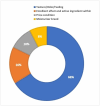Parental Attitudes and Practices regarding Atopic Dermatitis: A Cross-Sectional Study among a Thai Population
- PMID: 39062319
- PMCID: PMC11276138
- DOI: 10.3390/children11070870
Parental Attitudes and Practices regarding Atopic Dermatitis: A Cross-Sectional Study among a Thai Population
Abstract
Background: Atopic dermatitis (AD) is a chronic inflammatory skin disorder common in children. Successful pediatric AD therapy requires parental assistance. Thus, evaluating parental knowledge, attitudes, and behaviors regarding childhood AD may lead to more educational recommendations to help children control AD in the future. This study examined parents' knowledge, attitudes, and conduct concerning AD in families with and without children with AD.
Method: The Pediatric Department, Faculty of Medicine, Khon Kaen University, Thailand, conducted a cross-sectional study from June to December 2023. Parents of children who visited the dermatology clinic with or without AD were asked to complete a Google form questionnaire.
Results: A total of 372 parents answered a questionnaire about AD pathophysiology, knowledge, attitudes, and practices. The participants were 293 (78.8%) female participants and 79 (21.2%) male participants. The average age was 29.79 (SD 4.91). Most parents (319, 85.8%) did not work in the medical field, and more than half (228 instances, 61.29%) had children diagnosed with AD.
Conclusions: Parents of children with AD understood AD causes and triggers better than parents of children without AD. But, "exposure to furry toys" that may contain dust and allergies and "infection" that may cause AD flare-ups were the most common triggers, regardless of the group. Appropriate information should be supplied because both the parents of children with AD and those of children without AD reported immediate food avoidance without confirmatory testing, which might lead to malnutrition. Clinicians and families handling patients with AD require further education.
Keywords: atopic dermatitis; attitude; children; knowledge; parents; practice.
Conflict of interest statement
The authors declare no conflicts of interest.
Figures
References
Grants and funding
LinkOut - more resources
Full Text Sources



